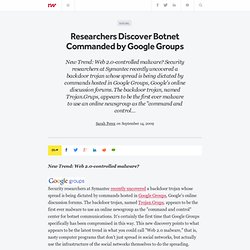

Mashed Life. Unvanish. We at the University of Texas at Austin, Princeton and the University of Michigan have broken the security guarantees of the Vanish system with a system we call Unvanish. The increasing prevalence of networked computing and communications combined with the ubiquity of caching, backup, and archival tools have resulted in world where data sent or shared or any way over the Internet can be difficult or impossible to control or destroy. This is a critical privacy concern as it impacts anyone who uses the Internet for communication, be it by using email, social networking tools such as Facebook or Flickr, file-sharing systems and so on. Vanish is an experimental computer system created at the University of Washington that claims to provide a self-destruct mechanism for digital data.
Vanish encodes data, such as emails, photographs or video so that it can only be read for a limited time window, such as eight hours. Researchers Discover Botnet Commanded by Google Groups. New Trend: Web 2.0-controlled malware?

Security researchers at Symantec recently uncovered a backdoor trojan whose spread is being dictated by commands hosted in Google Groups, Google's online discussion forums. The backdoor trojan, named Trojan.Grups, appears to be the first ever malware to use an online newsgroup as the "command and control" center for botnet communications. It's certainly the first time that Google Groups specifically has been compromised in this way. This new discovery points to what appears to be the latest trend in what you could call "Web 2.0 malware," that is, nasty computer programs that don't just spread in social networks, but actually use the infrastructure of the social networks themselves to do the spreading.
Using Google Groups for Corporate Spying. Yubikey - simple approach to authenticati.